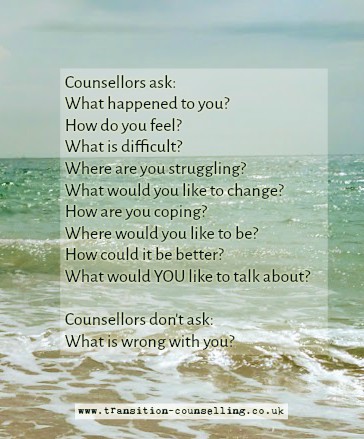What is Counselling?
Counselling allows you time and space to discuss difficulties you may be facing, or to examine issues which you feel are holding you back from leading the kind of life you would like. Counselling isn’t about giving advice; it allows you to find your own answers and solutions.
You will be able to speak freely and express yourself in a supportive, non judgemental environment. The aim is to explore any issues or situations you feel are causing problems in your life. As a professionally qualified counsellor I have been trained to assist you in this process and help you to move forward.
What type of Counselling will I be offered?
My background and training has been integrative which means that I offer a range of approaches tailored to your needs. These include CBT, Person Centred and Psychodynamic counselling. I’m also interested in the neurological and physical aspects of adverse mental health and will help you to better understand the process and effects of conditions such as anxiety and depression. It can be very reassuring to find out how and why this isn’t ‘all in your head’.
I’m a registered and accredited member of the British Association for Counselling and Psychotherapy. This means that I follow a professional ethical framework, offer a professional standard of work and undertake ongoing training and supervision.
How can I access my Counsellor?
At present I am offering both face to face and remote sessions. Face to face sessions take place in line with BACP Covid recommendations. For remote sessions you can choose either work through a secure tailored online video platform or via phone. It is useful to think about which channel enables you to feel more comfortable or which is easier for you to access.
How long is a Counselling session and how many will I need?
Each counselling session lasts at least 50 minutes, this is generally referred to as a ‘therapeutic hour’.
The number of sessions varies from person to person and is dependent on a number of factors. Rather than booking a number of sessions at once I suggest that clients book as they go along, simply committing to whether or not they wish to attend a further session. Once you’ve started counselling you may find you only need a few sessions to enable the changes you want in your life. Or you may feel you need longer term work. This will be reviewed and discussed on a regular basis.
What about Confidentiality?
Everything you say during therapy is totally confidential. The only exceptions will be if there’s concern about your safety or that of others. There are also statutory requirements which must be met these are outlined in the paperwork you will be sent before we start.
Who are the British Association for Counselling and Psychotherapy (BACP)?
With over 50,000 members, the BACP is the largest professional body representing counselling and psychotherapy in the UK. Members are dedicated to practicing responsibly, ethically and to the highest of standards. BACP’s register of counsellors and psychotherapists is accredited by the Professional Standards Authority for Health and Social Care.
For further details please see the BACP website: http://www.bacp.co.uk.
How can I find out more before I decide to start Counselling?
If you would like to find out more about counselling in general you are welcome to look at a range of online resources including the It’s Good to Talk and BACP websites.
To find out more or to book an appointment:
Email: info@transition-counselling.co.uk
Phone, Text or WhatsApp: 07572 282514
Facebook: www.facebook.com/transitioncounselling/
I understand that this is an important, sometimes difficult, decision and I am happy to answer any questions you may have.
